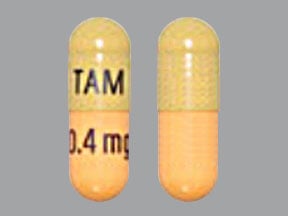
Flomax Coupons & Savings Card – Discount Prices from $4.20
Brand for: Tamsulosin
My prescription
Edit
0.4MG, Tamsulosin (30 Capsules)
Select pharmacy

CVS
$19.54
COUPON PRICE
Walmart
$4.20
COUPON PRICE
Albertsons
$9.56
COUPON PRICE
Walgreens
$10.57
COUPON PRICEFlomax savings card
Show this card to your pharmacist
Walmart
$4.20
BIN
ID
PCN
GRP
019876
LHAC6DADC5
CHIPPO
LHX
Powered by
Related alpha blockers prescriptions
More prescriptions for benign prostatic hyperplasia
Related alpha blockers prescriptions
More prescriptions for benign prostatic hyperplasia
Flomax (Tamsulosin) dosage forms
Dosage Quantity Price from Per unit 0.4MG 30 Capsules $4.20 $0.14 0.4MG 7 Capsules $2.90 $0.41 0.4MG 10 Capsules $3.07 $0.31 0.4MG 60 Capsules $5.90 $0.10 0.4MG 90 Capsules $14.09 $0.16 0.4MG 180 Capsules $24.39 $0.14
| Dosage | Quantity | Price from | Per unit |
|---|---|---|---|
| 0.4MG | 30 Capsules | $4.20 | $0.14 |
| 0.4MG | 7 Capsules | $2.90 | $0.41 |
| 0.4MG | 10 Capsules | $3.07 | $0.31 |
| 0.4MG | 60 Capsules | $5.90 | $0.10 |
| 0.4MG | 90 Capsules | $14.09 | $0.16 |
| 0.4MG | 180 Capsules | $24.39 | $0.14 |
What is the biggest side effect of Flomax?
The biggest side effect of Flomax (tamsulosin) is dizziness, particularly when standing up quickly from a sitting or lying position, which can lead to a drop in blood pressure. This is known as orthostatic hypotension. It is important for individuals taking Flomax to rise slowly to minimize this effect.
Why does Flomax stop you from ejaculating?
Flomax (tamsulosin) can affect ejaculation because it relaxes the muscles in the prostate and bladder neck, which can interfere with the normal process of ejaculation. This can lead to a condition known as retrograde ejaculation, where semen enters the bladder instead of exiting through the urethra. This is a known side effect of the medication and is generally not harmful, but it can be concerning for some individuals.
What are the side effects of Flomax in the elderly?
Flomax, or tamsulosin, can cause several side effects in the elderly. Common side effects include dizziness, especially when standing up quickly, which can increase the risk of falls. Other side effects may include headache, runny or stuffy nose, and ejaculation problems. Less commonly, it can cause a drop in blood pressure, fainting, or allergic reactions. It's important for elderly patients to be monitored for these side effects and to discuss any concerns with their healthcare provider.
Will Flomax keep me from ejaculating?
Flomax (tamsulosin) can cause a condition known as retrograde ejaculation, where semen enters the bladder instead of exiting through the urethra during ejaculation. This can result in little to no semen being expelled during orgasm. It is a known side effect of the medication, but not everyone will experience it. If there are concerns about this side effect, it is advisable to discuss them with a healthcare provider.
How long can a man be on Flomax?
Flomax (tamsulosin) can be taken long-term as prescribed by a healthcare provider. The duration of use depends on the individual's condition and response to the medication. It is important for the patient to have regular follow-ups with their healthcare provider to monitor the effectiveness and any potential side effects. The healthcare provider will determine the appropriate duration of treatment based on the patient's needs.
